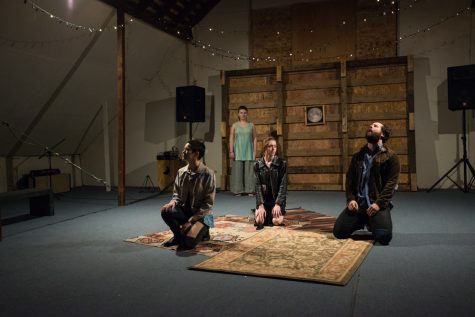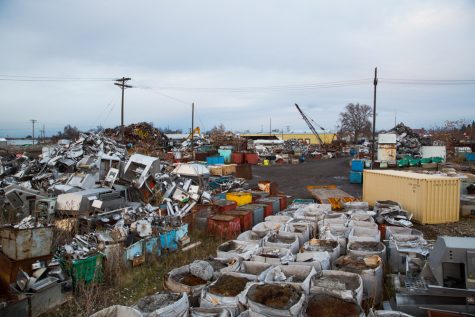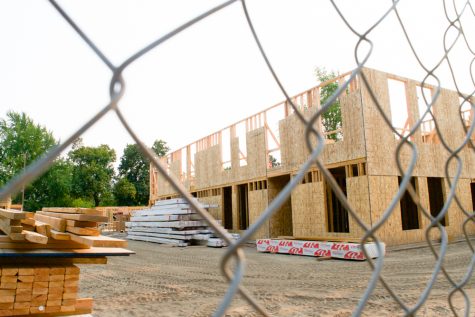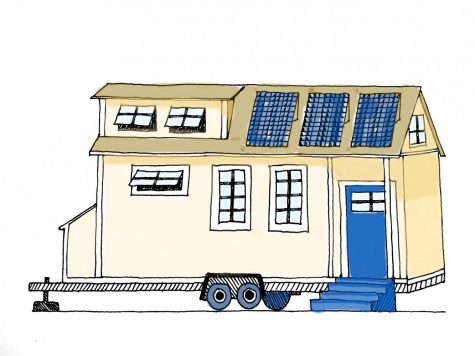Emission Control
Whitman sets its sites on carbon neutrality
February 16, 2017
Brandon Bishop is off to a running start on his second semester as Whitman’s Sustainability Coordinator. In the last few months, Bishop’s office has been involved in the creation and takeover of several campus sustainability programs, old and new, where he and a growing group of students are seeking new ways to expand the office’s outreach on campus and pursue its goal of carbon-neutrality.
An Action Plan
Bishop entered his position in September with the express goal of ensuring the college’s progress toward the Climate Action Plan it adopted last May. That plan aims toward total carbon neutrality by 2050 through a combination of emissions reductions and carbon offsets.
The first milestone of that plan is rapidly approaching; the plan aimed to reduce emissions by 50 percent between 2013 levels and 2020. Also scheduled for 2020 are the complete offset of emissions from electricity and natural gas use and a plan to introduce solar power sources on campus.
Whitman’s first on-campus solar panels will be atop the dining and residence halls currently being built behind Anderson Hall, Bishop said, producing a total of 116 kilowatts of electricity. The college is also currently purchasing about 17 megawatts in Renewable Energy Credits (RECs), that offset emissions by paying for the maintenance of renewable energy sources elsewhere in the country (Whitman’s for example, are from wind turbines in Colorado). Bishop stressed that RECs are a short-term solution.
“Eventually, our plan is to wean our way off of renewable energy credits,” he said, “because that’s not true carbon neutrality.”
The plan also includes ways to directly reduce emissions through reduced energy use, including initiatives by students and the college alike. Progress in that arena is difficult to measure. The most recent data available on Whitman’s emissions is from 2013, and while Bishop plans to conduct evaluations yearly starting with this year, that report is not yet complete.
From Coordinator to Office
Some of those efforts to reduce emissions are brought to the table by student partners of the Sustainability Office. Those partners include interns and employees who report to Bishop, which senior Dani Hupper, ASWC Sustainability Chair, says is a significant change from the tenure of Bishop’s predecessor, Tristan Sewell, who operated more on his own.
“Brandon really has a vision of having leadership positions in the office of sustainability,” Hupper said. “He’s trying to make it the office of sustainability, not just the sustainability coordinator. He’s really trying to grow it, and that’s something new and different.”
Bishop confirmed that observation.
“My long-term goals are to develop us into an office of sustainability where we have student academic interns, where we have student work-study interns, and they are all working on a variety of projects,” Bishop said. “That way, you’re hitting all of the points of sustainability around the campus.”
All told, eight students currently work for programs under the umbrella of the Office of Sustainability, including two interns for the bike-sharing program which the Office took over from ASWC last semester; five from the college’s “zero-waste” recycling initiative, which began as a student project long before Bishop’s arrival; and an outreach coordinator, an entirely new position filled two weeks ago. All are paid, in part through work-study and in part through the Office’s discretionary fund, with the exception of the zero-waste interns.
The Outreach Coordinator position is occupied by sophomore Genean Wrisley. Her responsibilities include promoting programs affiliated with the Office of Sustainability as well as making the office more visible on and off-campus.
“Basically, what I’ve been doing so far is trying to gain awareness on campus for the fact that we have a sustainability office, the fact that there’s the bikeshare program and different events,” Wrisley said.
She is also tasked with keeping Whitman involved with sustainability initiatives off campus. Wrisley has been reaching out to other colleges in the region in preparation for the Washington Higher Education Sustainability Conference, that will be held at Gonzaga University this weekend.
Wrisley is currently the only Sustainability Office worker not affiliated with a particular program, but Bishop says he hopes to change that. Other open positions include an energy assistant, who would help find ways to decrease energy use on campus, and an as-yet unnamed position that would help Bishop to work with the city to better coordinate sustainability initiatives on and around campus.
For now, staffing and outreach are the biggest ways that the office is growing, but in the long term it may also expand its physical space. Bishop currently works out of a small, windowless office in the Physical Plant, but he hopes someday to have an office closer to students, he says. Other ideas include an exhibition space for professors and sustainability staff to use for educational purposes. As of right now, both of those ideas are distant hypotheticals, Bishop says, but Wrisley offered her support for them.
“Having a sustainability office is a start, but some schools have a building dedicated to sustainability. We have a closet,” Wrisley said. “And so things like that, I think, are really frustrating, but I think that that’s a first step toward trying to make Whitman really walk its talk.”








